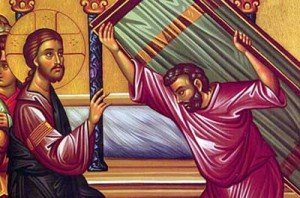With Your divine protection, O Lord, as You once raised the paralytic,
now lift up my soul paralyzed with all kinds of sin and evil deeds of wickedness,
so that, as saved, I may cry out to You:
“Glory be to Your might, O Merciful Christ!”
 The weekends after Pascha (Easter) are all given names which relate to the particular scriptural story that is proclaimed in the Gospel. It is the Church’s way to help us more fully understand what it means to be a follower of the Risen Christ. Each Gospel story shares with us another aspect of what it means to be a Christian.
The weekends after Pascha (Easter) are all given names which relate to the particular scriptural story that is proclaimed in the Gospel. It is the Church’s way to help us more fully understand what it means to be a follower of the Risen Christ. Each Gospel story shares with us another aspect of what it means to be a Christian.
The first weekend we remembered the Apostle Thomas who doubted the Lord’s Resurrection until he actually saw Jesus in person. In this story Jesus says: Blest are they who have not seen and have believed. This has a direct message for us who have not seen the Lord in person.
The second weekend we remembered the Ointment-Bearing Women. They performed one of the Corporal Works of Mercy, namely burying the dead. This story stresses the fact that as followers of Jesus we are called to be of service to others, that is perform Works of Mercy, as a way of making God’s Kingdom real in the present day. Such works make God’s love real in the world and brings us closer to Him.
On this third weekend we recall the story of Jesus curing the paralytic man at the Pool of Bethesda. Followers of Jesus are reminded that we humans can easily become spiritually paralyzed, unable to be of service to others, when we allow anxieties or fears to dominate our lives. The story clearly tells us that Jesus knew that He would be criticized when he cured the man on the Sabbath. He did not allow Himself to be distracted from performing a work of mercy because of what others would say about Him doing this on the Sabbath. He knew that this would antagonize those who were sticklers about the Law and had little compassion for others. He, nevertheless, cured the man because He had compassion for him.
This story reminds us of how we must live if we are to be followers of Jesus. We must always be compassionate regardless of how others might judge our actions. It is more important to live like Jesus lived than to be afraid of being different from our peers. We are called to live in a manner which reflects what we believe. Compassion for others is the way we are called to live.
